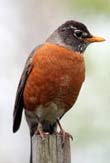Pesticide Leaves Robins Unable to Carry a Tune

Nearly half a century after DDT was first dumped across acres of North American farmland and three decades after it was banned in the United States and Canada, the toxic pesticide still has damaging effects on local species, according to a new study.
Robins exposed to DDT before birth had damage to regions of the brain that enable them to sing and protect territory. Both functions are integral to mating and were more impaired in male robins, potentially leaving them unable to attract females.
"This is the first study that documented a neural effect from DDT in a natural population in any species," said Andrew Iwaniuk, a post-doctoral research fellow at the University of Alberta and an author of the study published in Behavioural Brain Research. The majority of previous research focused on acute, rather than chronic conditions and usually in controlled lab environments, he says.
Can't build a nest
The researchers collected eggs from a population of wild birds and found that some had high levels of DDT, while others had no exposure at all. After the birds hatched, they raised both groups in a pesticide-free environment, then sacrificed them at two years to examine their brain tissue.
| Singing Science |
| How Songbirds Change Tune |
The group that came in contact with the pesticide during development had up to 30 percent less tissue in certain areas of the brain—and they were unable to sing complicated songs, defend their territory or even build nests properly.
The researchers aren't sure why some eggs had higher levels of DDT than others, but they think that as mother robins forage for earthworms, they pick up pesticides in the soil, some more than others.
Get the world’s most fascinating discoveries delivered straight to your inbox.
Because eggs are rich in fat, they are perfect receptacles for fat-soluble DDT. So as the mother feeds, the DDT is deposited in her eggs. Brain tissue is also highly fatty, "so the DDT likes to hang out there," Iwaniuk said.
Ongoing problem
Iwaniuk estimates that at least 15 to 20 generations of robins have been affected since the pesticide was first applied. Because they live in orchards where soil is not regularly aerated, he sees little hope for change, at least in the near future.
As long as it remains there, DDT has the potential to impact a wide range of animals.
The researchers don't know how far up the food chain the toxin might travel, but hawks and weasels that eat robins could potentially be at risk as well. Iwaniuk says he is particularly concerned about aboriginal populations that live in the area and subsist on natural food sources.
Even for people who won't come in direct contact with DDT, Iwaniuk thinks there's a larger lesson here.
"Yes, it happened historically, but there are still problems with pesticides," he says. "They have an extremely long half-life and just because we use one today, that doesn't mean it will always be safe."
- Gallery: Rare and Exotic Birds
- Human Pollutants Collect in Bird Droppings
- Pesticides Found In Most Rivers, Streams
- Gallery: Birds of Prey
- All About Birds
 Live Science Plus
Live Science Plus





